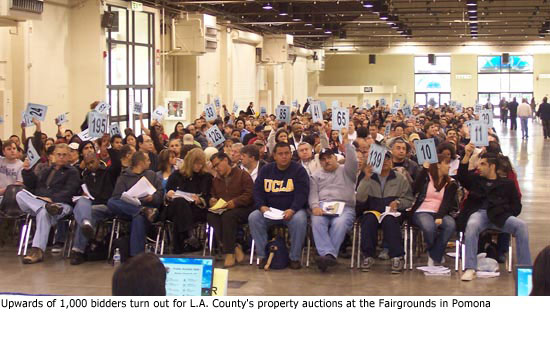Going once, twice…sold by L.A. County
June 30, 2010
Los Angeles County’s annual property auction is no place for the uninformed or faint of heart.
“You can’t find more adrenaline in one place other than a battlefield,” says John McKinney of the county’s Department of Treasurer and Tax Collector. Come October, he says, upwards of 1,000 bidders—some lugging bags of cash—will converge on the Los Angeles County Fairgrounds in Pomona for a shot at more than 2,000 properties headed for the auction block because the owners defaulted on the property taxes.
“It’s exciting,” says McKinney—and risky. “Some bidders have common sense,” he says. “Some don’t.”
When it comes to these properties, forget those TV infomercials that promise fast riches from buying land at government auctions, McKinney warns. The vast majority of the L.A. County properties are vacant, some worth less than the amount of the delinquent property taxes. Some parcels might be located in desert washes, vulnerable to flash flooding, or on a Malibu hillside too unstable for any structures. Others might have no direct access because they’re hemmed in by other properties.
That said, there’s also some gems for bidders with enough sophistication and research to spot them.
“To prosper at a tax auction, you have to know what you’re doing,” says McKinney, who has overseen the treasurer-tax collector’s auctions for the past six years. It’s not unusual for novices to make a mistake, McKinney says, “and then there’s nothing we can do for them, as much as we’d like to.”
That’s why the county auction book, which lists the properties, cautions in bold type: “At least investigate before you bid.” (Here’s the most recent auction list.)
On the other hand, there are companies and individuals who “make a handsome living” by buying parcels whose owners have defaulted on their property taxes—three years for vacant land, five years for residential properties. “The big parcels are bought by people who know what they’re doing.”
These buyers often have crews of investigators who study and visit the properties to make sure they’re usable and free of other kinds of liens that could boost the final costs beyond the minimum bid set by the county, which is based on the amount of delinquent taxes, penalties and fees.
The auctions, held in a huge exhibition hall at the Pomona fairgrounds, generally span three days. Each property, pitched by a fast-talking auctioneer, sells within five minutes, according to McKinney, and brings in total haul of between $3 million and $12 million. The county’s cut is about 22 cents on the dollar, with the rest going to schools, flood districts and other government services funded by property taxes. The process leading up to the October auction began this week when, as required by law, the Board of Supervisors authorized this year’s list of tax-defaulted properties.
Although the vast majority of properties are vacant, the upcoming auction does include 240 parcels listed in assessor records as residential. For these, the county dispatches investigators to determine whether anyone is living in them and, if so, whether they understand that the property is headed for auction. Often, the investigators find that the homes are empty, have burned down or been demolished by cities because they were drug houses or gang hangouts.
McKinney says he worries that the number of auctioned homes could begin to climb in the years ahead for an entirely new reason. Last year, to save money, the state ended a program that paid property taxes for seniors and disabled people earning less than $39,000 a year.
“These people are terrified when they come into our office,” says McKinney, who noted that there were 1,000 participants in the axed program. “Some of these folks, It’s not doing their nerves any good. We’re hoping it doesn’t turn into a tragedy in five years.”
Posted 06/30/10













 405 bridge work causes a stink
405 bridge work causes a stink
